第三章 代词 课件(共33张PPT) 2024年中考英语二轮专题复习(广东专版)
文档属性
| 名称 | 第三章 代词 课件(共33张PPT) 2024年中考英语二轮专题复习(广东专版) | 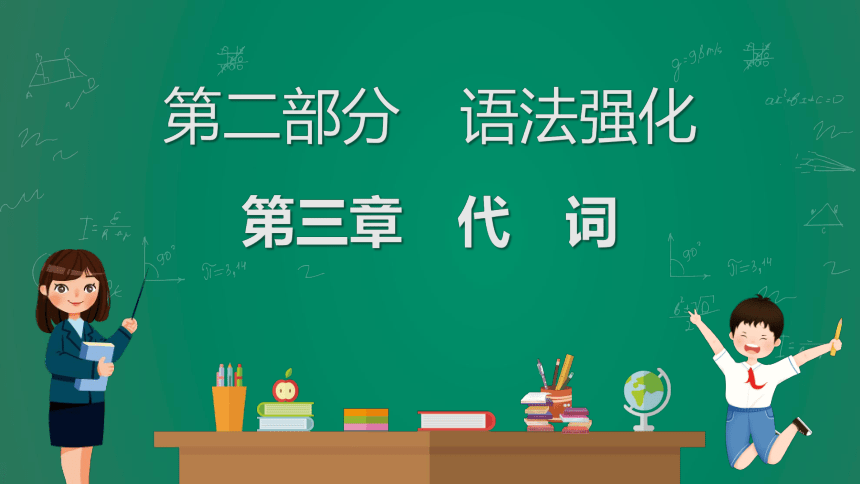 | |
| 格式 | pptx | ||
| 文件大小 | 2.9MB | ||
| 资源类型 | 教案 | ||
| 版本资源 | 通用版 | ||
| 科目 | 英语 | ||
| 更新时间 | 2024-06-02 17:44:51 | ||
图片预览

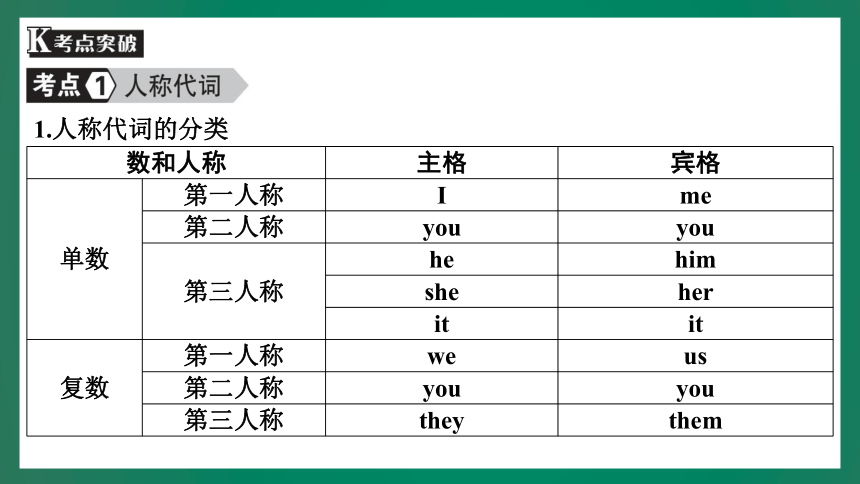
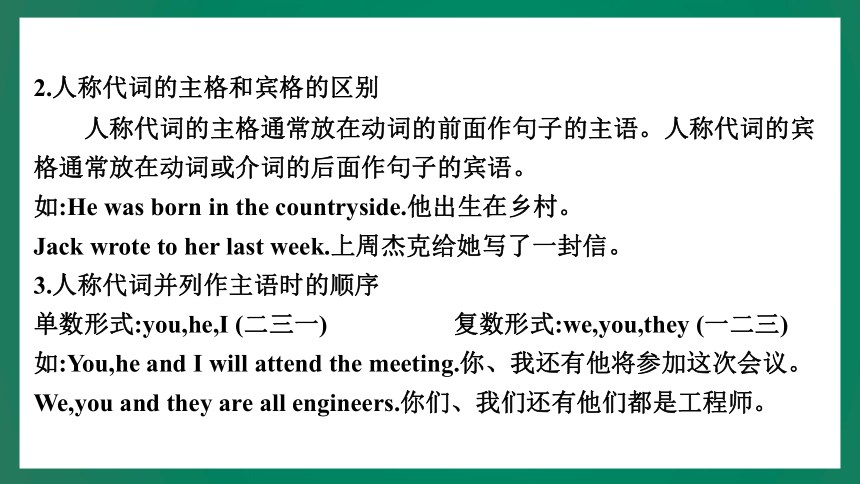
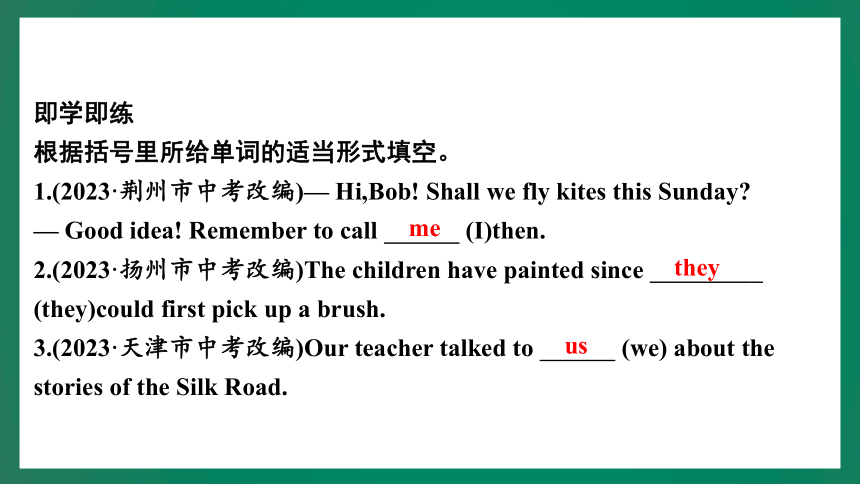
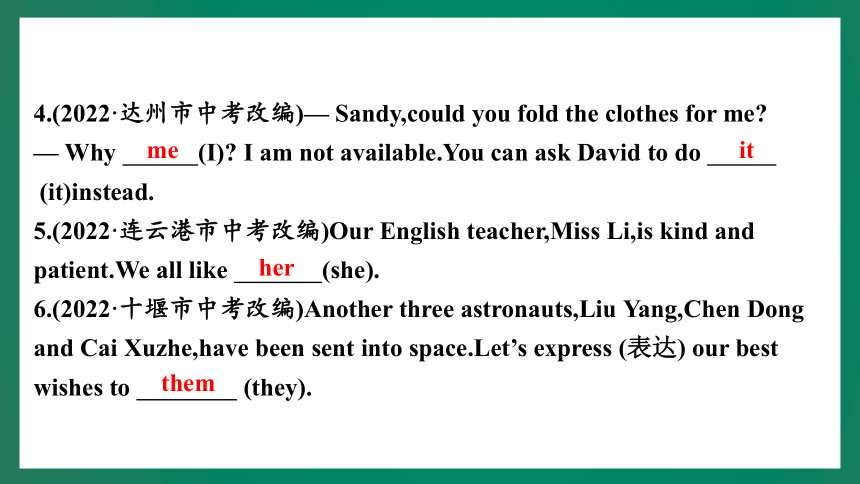
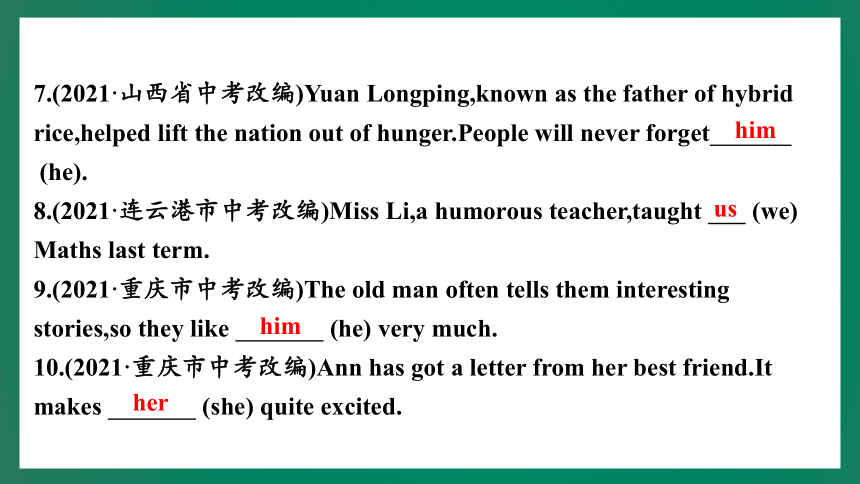
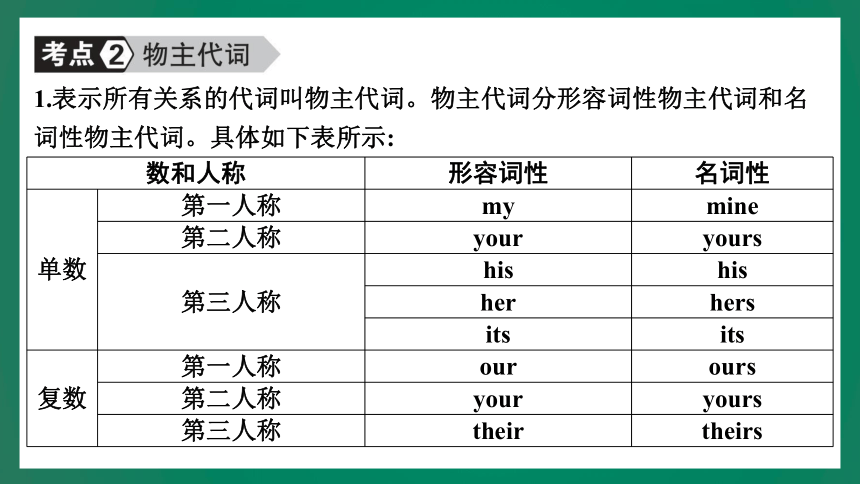
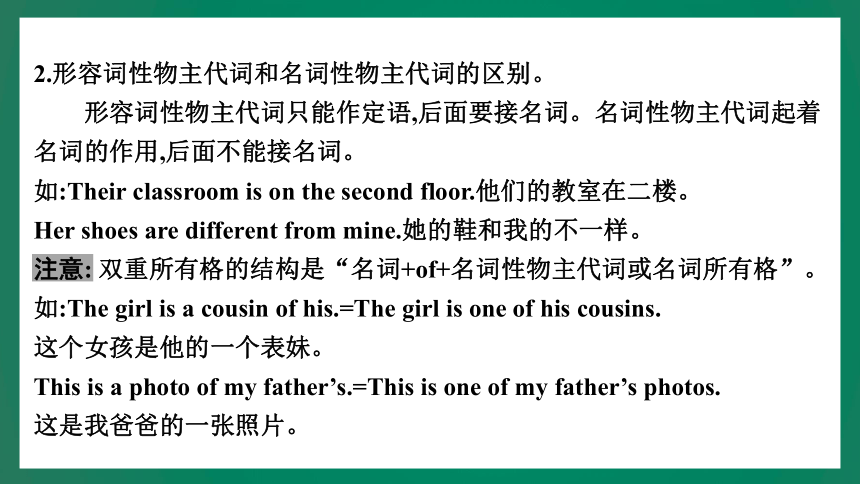
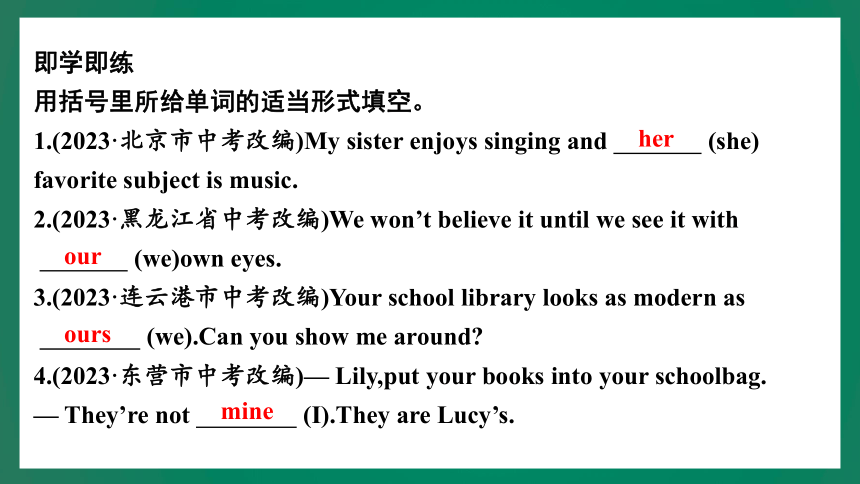
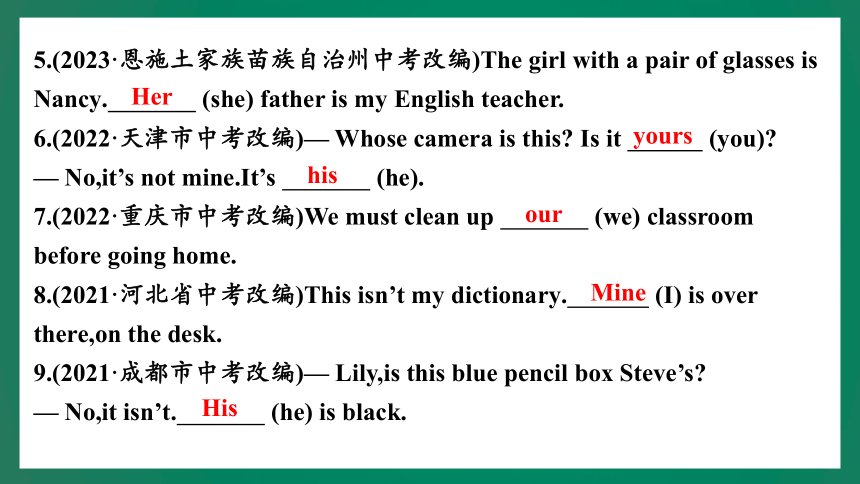
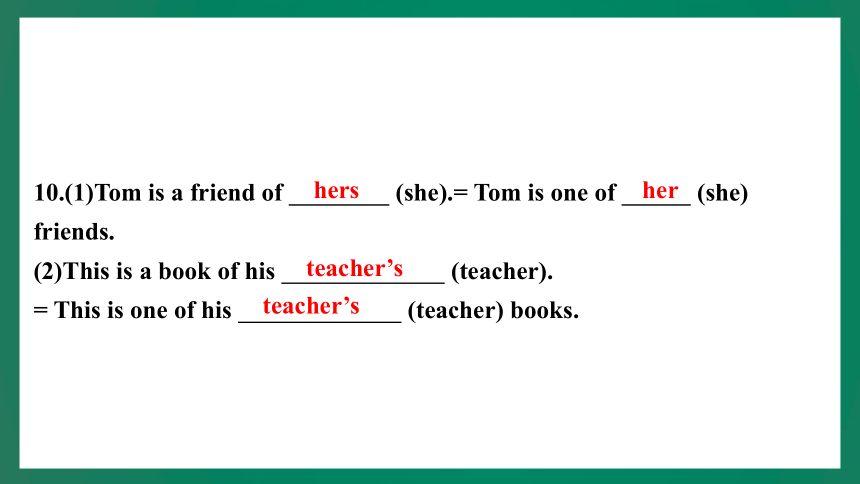

文档简介
(共33张PPT)
第二部分 语法强化
第三章 代 词
数和人称 主格 宾格
单数 第一人称 I me
第二人称 you you
第三人称 he him
she her
it it
复数 第一人称 we us
第二人称 you you
第三人称 they them
1.人称代词的分类
2.人称代词的主格和宾格的区别
人称代词的主格通常放在动词的前面作句子的主语。人称代词的宾格通常放在动词或介词的后面作句子的宾语。
如:He was born in the countryside.他出生在乡村。
Jack wrote to her last week.上周杰克给她写了一封信。
3.人称代词并列作主语时的顺序
单数形式:you,he,I (二三一) 复数形式:we,you,they (一二三)
如:You,he and I will attend the meeting.你、我还有他将参加这次会议。
We,you and they are all engineers.你们、我们还有他们都是工程师。
即学即练
根据括号里所给单词的适当形式填空。
1.(2023·荆州市中考改编)— Hi,Bob! Shall we fly kites this Sunday
— Good idea! Remember to call (I)then.
2.(2023·扬州市中考改编)The children have painted since _
(they)could first pick up a brush.
3.(2023·天津市中考改编)Our teacher talked to (we) about the stories of the Silk Road.
us
they
me
4.(2022·达州市中考改编)— Sandy,could you fold the clothes for me
— Why (I) I am not available.You can ask David to do _
(it)instead.
5.(2022·连云港市中考改编)Our English teacher,Miss Li,is kind and patient.We all like (she).
6.(2022·十堰市中考改编)Another three astronauts,Liu Yang,Chen Dong and Cai Xuzhe,have been sent into space.Let’s express (表达) our best wishes to (they).
them
her
it
me
7.(2021·山西省中考改编)Yuan Longping,known as the father of hybrid rice,helped lift the nation out of hunger.People will never forget _
(he).
8.(2021·连云港市中考改编)Miss Li,a humorous teacher,taught (we) Maths last term.
9.(2021·重庆市中考改编)The old man often tells them interesting stories,so they like (he) very much.
10.(2021·重庆市中考改编)Ann has got a letter from her best friend.It makes (she) quite excited.
her
him
us
him
1.表示所有关系的代词叫物主代词。物主代词分形容词性物主代词和名词性物主代词。具体如下表所示:
数和人称 形容词性 名词性
单数 第一人称 my mine
第二人称 your yours
第三人称 his his
her hers
its its
复数 第一人称 our ours
第二人称 your yours
第三人称 their theirs
2.形容词性物主代词和名词性物主代词的区别。
形容词性物主代词只能作定语,后面要接名词。名词性物主代词起着名词的作用,后面不能接名词。
如:Their classroom is on the second floor.他们的教室在二楼。
Her shoes are different from mine.她的鞋和我的不一样。
注意: 双重所有格的结构是“名词+of+名词性物主代词或名词所有格”。
如:The girl is a cousin of his.=The girl is one of his cousins.
这个女孩是他的一个表妹。
This is a photo of my father’s.=This is one of my father’s photos.
这是我爸爸的一张照片。
即学即练
用括号里所给单词的适当形式填空。
1.(2023·北京市中考改编)My sister enjoys singing and (she) favorite subject is music.
2.(2023·黑龙江省中考改编)We won’t believe it until we see it with
(we)own eyes.
3.(2023·连云港市中考改编)Your school library looks as modern as
(we).Can you show me around
4.(2023·东营市中考改编)— Lily,put your books into your schoolbag.
— They’re not (I).They are Lucy’s.
mine
ours
our
her
5.(2023·恩施土家族苗族自治州中考改编)The girl with a pair of glasses is Nancy. (she) father is my English teacher.
6.(2022·天津市中考改编)— Whose camera is this Is it (you)
— No,it’s not mine.It’s (he).
7.(2022·重庆市中考改编)We must clean up (we) classroom before going home.
8.(2021·河北省中考改编)This isn’t my dictionary. (I) is over there,on the desk.
9.(2021·成都市中考改编)— Lily,is this blue pencil box Steve’s
— No,it isn’t. (he) is black.
His
Mine
our
his
yours
Her
10.(1)Tom is a friend of (she).= Tom is one of (she) friends.
(2)This is a book of his (teacher).
= This is one of his (teacher) books.
teacher’s
teacher’s
her
hers
1.反身代词的单复数形式
数和人称 反身代词
单数 第一人称 myself
第二人称 yourself
第三人称 himself
herself
itself
复数 第一人称 ourselves
第二人称 yourselves
第三人称 themselves
2.反身代词的用法
(1)作宾语,位于及物动词或介词之后。
如:We enjoyed ourselves very much last night.我们昨晚玩得很开心。
The boy can take care of himself.那个男孩能照顾自己。
(2)作主语或宾语的同位语,用于加强语气,放在主语后或句尾。
如:He himself did the cleaning.=He did the cleaning himself.
他亲自搞清洁。
注意: 反身代词不作定语,常用one’s own表示“某人自己的”。
如:I think that I should have my own shop.我认为我应该有自己的店。
(3)反身代词常用短语。如:
teach oneself / learn…by oneself 自学 by oneself 独自
come to oneself 恢复知觉 say to oneself 自言自语
devote oneself to 致力于…… enjoy oneself 玩得开心
help oneself to 随便吃(或喝)……
即学即练
用括号里所给单词的适当形式填空。
1.(2023·河北省中考改编)— Where did you get the toy car
— From Betty.She made it (she).
2.(2023·沈阳市中考改编)Don’t ride your bike too fast,or you may hurt
(you).
3.(2023·齐齐哈尔市中考改编)Teachers often say that teenagers should learn to look after (they).
themselves
yourself
herself
4.(2023·无锡市中考改编)Think about it and ask (you): have you really done everything right
5.(2023·达州市中考改编)We should learn to be responsible for
(us),not always waiting to be pushed.
6.(2022·成都市中考改编) — Where did you get this sky lantern
— I made it by (I).
7.Little Tom fell off the bike,and he hurt (he).
8.The work (it) is easy.
itself
himself
myself
ourselves
yourself
距离 单数 复数
指近处 this these
指远处 that those
1.作主语、宾语、表语。
如:This is a fan,and that is an air conditioner.
这是一台风扇,那是一台空调。
2.在电话中,用this (我)表示本人,用that (你)表示对方。
如:Hello!This is Jenny (speaking).Who’s that
你好!我是珍妮。你是哪位
3.that和those常用于表示对双方作比较的句子中,代替前文提到的名词,以避免重复。that代替前面提到的单数名词或不可数名词;those代替前面提到的复数名词。
如:The weather in Beijing is as cold as that in Qingdao in winter.
在冬天,北京的天气和青岛的(天气)一样冷。
The population of China is larger than that of Japan.中国的人口要比日本的(人口)多。
The apples in this shop are much cheaper than those in that shop.
这家店的苹果比那家店的(苹果)便宜得多。
即学即练
用this,that,these或those填空。
1.Hello, is Tom.Who is speaking
2.The price of meat is higher than of rice.
3.The lights in your room are as bright as in mine.
4. books are mine,and are my brother’s.
5.— Look! What is — It’s an orange.
this / that
those
These
those
that
that
this
1.疑问代词的用法
疑问代词 用法 例句
who (谁) 作主语 Who is talking there 谁在那里讲话
作宾语(不能位于介词后) Who were you talking with just now
你刚才在和谁讲话呢
作表语 Who is the boy under the tree
在树下的那个男孩是谁
whom (谁) 只作宾语 With whom did you go 你和谁去的
whose (谁的) 作主语 They are both good at physics,but whose is better
他们两人都擅长物理,但谁的(物理)更好些
作宾语 Whose did you borrow,Jim’s or Tom’s
你借了谁的,吉姆的还是汤姆的
作表语 Whose dictionary is this 这本字典是谁的
作定语 Whose T-shirt is blue 谁的T恤衫是蓝色的
(续表)
疑问代词 用法 例句
which (哪个) 作主语 Which is your favourite,spring,summer or autumn
你最喜欢哪个,春天、夏天还是秋天
作宾语 Which will you choose in the end
最终你要选哪个
作定语 Which city will you go to 你要去哪个城市
what (什么) 作主语 What makes him cry 什么事把他弄哭了
作宾语 What do you usually do at weekends
你周末通常做什么
作表语 What is your name
你叫什么名字
作定语 What subject will you learn 你将要学什么科目
2.what与which 的区别
what 指不定数目中的“什么”,没有一定范围内的限定;which 指“哪一个;哪一些”,在一定范围内特指人或物。
如:Which skirt do you prefer,this one or that one
你更喜欢哪条裙子,这条还是那条
3.who与what在口语中的用法区别
如:Who is he 他是谁 (询问姓名或身份)
What is he 他是干什么的 (询问职业)
即学即练
用what,which,who,whom或whose填空。
1.— is your mother
— She is a teacher.
2.— is the woman under the tree
— She is my English teacher.
3. did you want to say
4. did he want,apples,pears or oranges
5. are you talking to
6. book is this
7.To did you talk just now
whom
Whose
Who / Whom
Which
What
Who
What
不定代词分为普通不定代词和复合不定代词。
1.普通不定代词
主要有some,any,both,all,another,other,each,either,neither,none,one,a few,few,a little,little,many,much等。常见普通不定代词的用法辨析如下表所示:
不定代词 用法 例句
one和it one与所替代的名词是“同名异物” My eraser is lost.I need to buy a new one.
我的橡皮丢了。我需要买一块新的。
it指的就是原来的事物,是“同名同物” I bought a new eraser,and I gave it to Mike.
我买了一块新的橡皮,我把它送给迈克了。
some和 any some用于肯定句及表示建议、反问、请求的疑问句中,期望得到肯定回答 Ms Green really gives us some useful advice.
格林女士确实给了我们一些有用的建议。
Would you like some tea 你要喝点茶吗
any用于否定句、疑问句或条件状语从句中 I don’t have any good suggestions.
我没有任何好建议。
If you have any questions,you may ask Joe.
如果你有任何问题,你可以去问乔。
each和 every each后面可加of,在句中可作主语、宾语、定语和同位语 Each of them has a ticket.他们每个人都有一张票。
They each have their own tickets.
他们每个人都有各自的票。
every只能作定语 Every student has a ticket.每个学生都有一张票。
(续表)
不定代词 用法 例句
many和 much many修饰或替代复数可数名词 Not many films are made in Finland.
芬兰出品的电影并不多。
much修饰或替代不可数名词 He has much homework to do.
他有很多家庭作业要做。
both和 all both意为“两者都”,表示复数 Both of my parents are interested in collecting stamps.
我父母都对集邮感兴趣。
all表示三者或三者以上的“都” All of the students have got their books.
所有的学生都拿到了他们的书。
either和 any either意为“二选一”,表示单数;“either…or…”意为“或者……或者……” There are flowers on either side of the road.
路的两旁都种了花。
Either you or I am going there tomorrow.
明天要么你去那里,要么我去那里。
any表示三者或三者以上的“任一” You don’t know any of my friends.
我的朋友你一个都不认识。
(续表)
不定代词 用法 例句
neither和 none neither意为“两者都不”,表示单数;“neither…nor…”意为“既不……也不……” Neither you nor she is able to speak French.
你和她都不会讲法语。
none表示三者或三者以上“都不” None of us likes storybooks.
我们没人喜欢故事书。
a few和 few, a little和 little a few表示有几个,修饰或替代可数名词复数 I’ll go to buy a few books.我要去买几本书。
few表示几乎没有(否定含义),修饰或替代可数名词复数 He has few friends here.
他在这儿几乎没有什么朋友。
a little表示有一点,修饰或替代不可数名词 Mary can speak a little Chinese.
玛丽会讲一点汉语。
little表示几乎没有(否定含义),修饰或替代不可数名词 There is little milk in the fridge,is there
冰箱里几乎没有牛奶了,不是吗
(续表)
不定代词 用法 例句
another, other, the other, others和 the others another泛指范围内的“另外一个” This T-shirt is too large for me.Can you show me another one
这件T恤衫太大了。能给我拿另外一件吗
other泛指范围内的“其他”,后接复数可数名词,不单独使用 Some students are cleaning the windows.Other students are sweeping the floor.
一些学生在擦窗户。其他人在扫地。
the other特指某范围内剩下的全体,后可接单数或复数名词,也可单独使用 The old man has two sons.One is in America and the other is in Canada.那位老人有两个儿子。
一个在美国,另一个在加拿大。
others=other+复数名词 Some students are cleaning the windows.Others are sweeping the floor.
一些学生在擦窗户。其他人在扫地。
the others=the other+复数名词 In our class only Tom is American.The others are Chinese.
在我们班只有汤姆是美国人。其余的都是中国人。
2.复合不定代词
somebody (某人) anybody (任何人) nobody (没有人) everybody (每人)
someone (某人) anyone (任何人) no one (没有人) everyone (每人)
something (某事物) anything (任何事物) nothing (没有东西) everything (每件事物)
(1)一般情况下,由some构成的复合不定代词用在肯定句中;由any构成的复合不定代词用在疑问句和否定句中;由no构成的复合不定代词表示否定意义。
如:He said nothing.=He didn’t say anything.他什么都没说。
(2)不定代词作主语时当作单数使用。
如:Something is wrong with her watch.她的手表出问题了。
(3)形容词修饰不定代词时要后置。
如:Is there anything interesting to tell me 有什么有趣的事要告诉我吗
即学即练
一、选择适当的不定代词填空。
1.— Your dress looks beautiful.Where did you buy
— In Shanghai.I can buy for you.(one / it)
2.She is from America.She can only speak Chinese so she has
friends in China.(a few / few / a little / little)
3.There is water in the bottle,is there (a little / little)
4.I feel tired.(a little / little)
5.Are there ladies in the audience (some / any)
6.Would you like water (some / any)
some
any
a little
little
few
a little
one
it
7.— Which do you prefer,cola or coffee
— are OK.(Both / All) / .I want a cup of tea.(Either / Neither)
8.Lucy and Lily are from America.(both / all)
9.Lucy,Lily and Tom are (both / all) from America.
And of them know(s) Chinese.(neither / none)
10.There are many trees on sides of the road.(either / both)
11.There are many trees on side of the road.(either / both)
12.She tried several ways,but of them worked.(neither / none)
none
either
both
none
all
both
Neither
Both
13.All children are pleased,for of them has got his own present.(each / every)
14.The cake is delicious.May I have one (another / the other / other)
15.Mr Green has four dictionaries.One is in the living room, _ three are in his study.(another / the other / other)
16.The population of Chongqing is bigger than that of other city in China.(all / some / any)
17.New York is bigger than all the cities in the US.(another / other / others)
other
any
the other
another
each
谢 谢 观 看
第二部分 语法强化
第三章 代 词
数和人称 主格 宾格
单数 第一人称 I me
第二人称 you you
第三人称 he him
she her
it it
复数 第一人称 we us
第二人称 you you
第三人称 they them
1.人称代词的分类
2.人称代词的主格和宾格的区别
人称代词的主格通常放在动词的前面作句子的主语。人称代词的宾格通常放在动词或介词的后面作句子的宾语。
如:He was born in the countryside.他出生在乡村。
Jack wrote to her last week.上周杰克给她写了一封信。
3.人称代词并列作主语时的顺序
单数形式:you,he,I (二三一) 复数形式:we,you,they (一二三)
如:You,he and I will attend the meeting.你、我还有他将参加这次会议。
We,you and they are all engineers.你们、我们还有他们都是工程师。
即学即练
根据括号里所给单词的适当形式填空。
1.(2023·荆州市中考改编)— Hi,Bob! Shall we fly kites this Sunday
— Good idea! Remember to call (I)then.
2.(2023·扬州市中考改编)The children have painted since _
(they)could first pick up a brush.
3.(2023·天津市中考改编)Our teacher talked to (we) about the stories of the Silk Road.
us
they
me
4.(2022·达州市中考改编)— Sandy,could you fold the clothes for me
— Why (I) I am not available.You can ask David to do _
(it)instead.
5.(2022·连云港市中考改编)Our English teacher,Miss Li,is kind and patient.We all like (she).
6.(2022·十堰市中考改编)Another three astronauts,Liu Yang,Chen Dong and Cai Xuzhe,have been sent into space.Let’s express (表达) our best wishes to (they).
them
her
it
me
7.(2021·山西省中考改编)Yuan Longping,known as the father of hybrid rice,helped lift the nation out of hunger.People will never forget _
(he).
8.(2021·连云港市中考改编)Miss Li,a humorous teacher,taught (we) Maths last term.
9.(2021·重庆市中考改编)The old man often tells them interesting stories,so they like (he) very much.
10.(2021·重庆市中考改编)Ann has got a letter from her best friend.It makes (she) quite excited.
her
him
us
him
1.表示所有关系的代词叫物主代词。物主代词分形容词性物主代词和名词性物主代词。具体如下表所示:
数和人称 形容词性 名词性
单数 第一人称 my mine
第二人称 your yours
第三人称 his his
her hers
its its
复数 第一人称 our ours
第二人称 your yours
第三人称 their theirs
2.形容词性物主代词和名词性物主代词的区别。
形容词性物主代词只能作定语,后面要接名词。名词性物主代词起着名词的作用,后面不能接名词。
如:Their classroom is on the second floor.他们的教室在二楼。
Her shoes are different from mine.她的鞋和我的不一样。
注意: 双重所有格的结构是“名词+of+名词性物主代词或名词所有格”。
如:The girl is a cousin of his.=The girl is one of his cousins.
这个女孩是他的一个表妹。
This is a photo of my father’s.=This is one of my father’s photos.
这是我爸爸的一张照片。
即学即练
用括号里所给单词的适当形式填空。
1.(2023·北京市中考改编)My sister enjoys singing and (she) favorite subject is music.
2.(2023·黑龙江省中考改编)We won’t believe it until we see it with
(we)own eyes.
3.(2023·连云港市中考改编)Your school library looks as modern as
(we).Can you show me around
4.(2023·东营市中考改编)— Lily,put your books into your schoolbag.
— They’re not (I).They are Lucy’s.
mine
ours
our
her
5.(2023·恩施土家族苗族自治州中考改编)The girl with a pair of glasses is Nancy. (she) father is my English teacher.
6.(2022·天津市中考改编)— Whose camera is this Is it (you)
— No,it’s not mine.It’s (he).
7.(2022·重庆市中考改编)We must clean up (we) classroom before going home.
8.(2021·河北省中考改编)This isn’t my dictionary. (I) is over there,on the desk.
9.(2021·成都市中考改编)— Lily,is this blue pencil box Steve’s
— No,it isn’t. (he) is black.
His
Mine
our
his
yours
Her
10.(1)Tom is a friend of (she).= Tom is one of (she) friends.
(2)This is a book of his (teacher).
= This is one of his (teacher) books.
teacher’s
teacher’s
her
hers
1.反身代词的单复数形式
数和人称 反身代词
单数 第一人称 myself
第二人称 yourself
第三人称 himself
herself
itself
复数 第一人称 ourselves
第二人称 yourselves
第三人称 themselves
2.反身代词的用法
(1)作宾语,位于及物动词或介词之后。
如:We enjoyed ourselves very much last night.我们昨晚玩得很开心。
The boy can take care of himself.那个男孩能照顾自己。
(2)作主语或宾语的同位语,用于加强语气,放在主语后或句尾。
如:He himself did the cleaning.=He did the cleaning himself.
他亲自搞清洁。
注意: 反身代词不作定语,常用one’s own表示“某人自己的”。
如:I think that I should have my own shop.我认为我应该有自己的店。
(3)反身代词常用短语。如:
teach oneself / learn…by oneself 自学 by oneself 独自
come to oneself 恢复知觉 say to oneself 自言自语
devote oneself to 致力于…… enjoy oneself 玩得开心
help oneself to 随便吃(或喝)……
即学即练
用括号里所给单词的适当形式填空。
1.(2023·河北省中考改编)— Where did you get the toy car
— From Betty.She made it (she).
2.(2023·沈阳市中考改编)Don’t ride your bike too fast,or you may hurt
(you).
3.(2023·齐齐哈尔市中考改编)Teachers often say that teenagers should learn to look after (they).
themselves
yourself
herself
4.(2023·无锡市中考改编)Think about it and ask (you): have you really done everything right
5.(2023·达州市中考改编)We should learn to be responsible for
(us),not always waiting to be pushed.
6.(2022·成都市中考改编) — Where did you get this sky lantern
— I made it by (I).
7.Little Tom fell off the bike,and he hurt (he).
8.The work (it) is easy.
itself
himself
myself
ourselves
yourself
距离 单数 复数
指近处 this these
指远处 that those
1.作主语、宾语、表语。
如:This is a fan,and that is an air conditioner.
这是一台风扇,那是一台空调。
2.在电话中,用this (我)表示本人,用that (你)表示对方。
如:Hello!This is Jenny (speaking).Who’s that
你好!我是珍妮。你是哪位
3.that和those常用于表示对双方作比较的句子中,代替前文提到的名词,以避免重复。that代替前面提到的单数名词或不可数名词;those代替前面提到的复数名词。
如:The weather in Beijing is as cold as that in Qingdao in winter.
在冬天,北京的天气和青岛的(天气)一样冷。
The population of China is larger than that of Japan.中国的人口要比日本的(人口)多。
The apples in this shop are much cheaper than those in that shop.
这家店的苹果比那家店的(苹果)便宜得多。
即学即练
用this,that,these或those填空。
1.Hello, is Tom.Who is speaking
2.The price of meat is higher than of rice.
3.The lights in your room are as bright as in mine.
4. books are mine,and are my brother’s.
5.— Look! What is — It’s an orange.
this / that
those
These
those
that
that
this
1.疑问代词的用法
疑问代词 用法 例句
who (谁) 作主语 Who is talking there 谁在那里讲话
作宾语(不能位于介词后) Who were you talking with just now
你刚才在和谁讲话呢
作表语 Who is the boy under the tree
在树下的那个男孩是谁
whom (谁) 只作宾语 With whom did you go 你和谁去的
whose (谁的) 作主语 They are both good at physics,but whose is better
他们两人都擅长物理,但谁的(物理)更好些
作宾语 Whose did you borrow,Jim’s or Tom’s
你借了谁的,吉姆的还是汤姆的
作表语 Whose dictionary is this 这本字典是谁的
作定语 Whose T-shirt is blue 谁的T恤衫是蓝色的
(续表)
疑问代词 用法 例句
which (哪个) 作主语 Which is your favourite,spring,summer or autumn
你最喜欢哪个,春天、夏天还是秋天
作宾语 Which will you choose in the end
最终你要选哪个
作定语 Which city will you go to 你要去哪个城市
what (什么) 作主语 What makes him cry 什么事把他弄哭了
作宾语 What do you usually do at weekends
你周末通常做什么
作表语 What is your name
你叫什么名字
作定语 What subject will you learn 你将要学什么科目
2.what与which 的区别
what 指不定数目中的“什么”,没有一定范围内的限定;which 指“哪一个;哪一些”,在一定范围内特指人或物。
如:Which skirt do you prefer,this one or that one
你更喜欢哪条裙子,这条还是那条
3.who与what在口语中的用法区别
如:Who is he 他是谁 (询问姓名或身份)
What is he 他是干什么的 (询问职业)
即学即练
用what,which,who,whom或whose填空。
1.— is your mother
— She is a teacher.
2.— is the woman under the tree
— She is my English teacher.
3. did you want to say
4. did he want,apples,pears or oranges
5. are you talking to
6. book is this
7.To did you talk just now
whom
Whose
Who / Whom
Which
What
Who
What
不定代词分为普通不定代词和复合不定代词。
1.普通不定代词
主要有some,any,both,all,another,other,each,either,neither,none,one,a few,few,a little,little,many,much等。常见普通不定代词的用法辨析如下表所示:
不定代词 用法 例句
one和it one与所替代的名词是“同名异物” My eraser is lost.I need to buy a new one.
我的橡皮丢了。我需要买一块新的。
it指的就是原来的事物,是“同名同物” I bought a new eraser,and I gave it to Mike.
我买了一块新的橡皮,我把它送给迈克了。
some和 any some用于肯定句及表示建议、反问、请求的疑问句中,期望得到肯定回答 Ms Green really gives us some useful advice.
格林女士确实给了我们一些有用的建议。
Would you like some tea 你要喝点茶吗
any用于否定句、疑问句或条件状语从句中 I don’t have any good suggestions.
我没有任何好建议。
If you have any questions,you may ask Joe.
如果你有任何问题,你可以去问乔。
each和 every each后面可加of,在句中可作主语、宾语、定语和同位语 Each of them has a ticket.他们每个人都有一张票。
They each have their own tickets.
他们每个人都有各自的票。
every只能作定语 Every student has a ticket.每个学生都有一张票。
(续表)
不定代词 用法 例句
many和 much many修饰或替代复数可数名词 Not many films are made in Finland.
芬兰出品的电影并不多。
much修饰或替代不可数名词 He has much homework to do.
他有很多家庭作业要做。
both和 all both意为“两者都”,表示复数 Both of my parents are interested in collecting stamps.
我父母都对集邮感兴趣。
all表示三者或三者以上的“都” All of the students have got their books.
所有的学生都拿到了他们的书。
either和 any either意为“二选一”,表示单数;“either…or…”意为“或者……或者……” There are flowers on either side of the road.
路的两旁都种了花。
Either you or I am going there tomorrow.
明天要么你去那里,要么我去那里。
any表示三者或三者以上的“任一” You don’t know any of my friends.
我的朋友你一个都不认识。
(续表)
不定代词 用法 例句
neither和 none neither意为“两者都不”,表示单数;“neither…nor…”意为“既不……也不……” Neither you nor she is able to speak French.
你和她都不会讲法语。
none表示三者或三者以上“都不” None of us likes storybooks.
我们没人喜欢故事书。
a few和 few, a little和 little a few表示有几个,修饰或替代可数名词复数 I’ll go to buy a few books.我要去买几本书。
few表示几乎没有(否定含义),修饰或替代可数名词复数 He has few friends here.
他在这儿几乎没有什么朋友。
a little表示有一点,修饰或替代不可数名词 Mary can speak a little Chinese.
玛丽会讲一点汉语。
little表示几乎没有(否定含义),修饰或替代不可数名词 There is little milk in the fridge,is there
冰箱里几乎没有牛奶了,不是吗
(续表)
不定代词 用法 例句
another, other, the other, others和 the others another泛指范围内的“另外一个” This T-shirt is too large for me.Can you show me another one
这件T恤衫太大了。能给我拿另外一件吗
other泛指范围内的“其他”,后接复数可数名词,不单独使用 Some students are cleaning the windows.Other students are sweeping the floor.
一些学生在擦窗户。其他人在扫地。
the other特指某范围内剩下的全体,后可接单数或复数名词,也可单独使用 The old man has two sons.One is in America and the other is in Canada.那位老人有两个儿子。
一个在美国,另一个在加拿大。
others=other+复数名词 Some students are cleaning the windows.Others are sweeping the floor.
一些学生在擦窗户。其他人在扫地。
the others=the other+复数名词 In our class only Tom is American.The others are Chinese.
在我们班只有汤姆是美国人。其余的都是中国人。
2.复合不定代词
somebody (某人) anybody (任何人) nobody (没有人) everybody (每人)
someone (某人) anyone (任何人) no one (没有人) everyone (每人)
something (某事物) anything (任何事物) nothing (没有东西) everything (每件事物)
(1)一般情况下,由some构成的复合不定代词用在肯定句中;由any构成的复合不定代词用在疑问句和否定句中;由no构成的复合不定代词表示否定意义。
如:He said nothing.=He didn’t say anything.他什么都没说。
(2)不定代词作主语时当作单数使用。
如:Something is wrong with her watch.她的手表出问题了。
(3)形容词修饰不定代词时要后置。
如:Is there anything interesting to tell me 有什么有趣的事要告诉我吗
即学即练
一、选择适当的不定代词填空。
1.— Your dress looks beautiful.Where did you buy
— In Shanghai.I can buy for you.(one / it)
2.She is from America.She can only speak Chinese so she has
friends in China.(a few / few / a little / little)
3.There is water in the bottle,is there (a little / little)
4.I feel tired.(a little / little)
5.Are there ladies in the audience (some / any)
6.Would you like water (some / any)
some
any
a little
little
few
a little
one
it
7.— Which do you prefer,cola or coffee
— are OK.(Both / All) / .I want a cup of tea.(Either / Neither)
8.Lucy and Lily are from America.(both / all)
9.Lucy,Lily and Tom are (both / all) from America.
And of them know(s) Chinese.(neither / none)
10.There are many trees on sides of the road.(either / both)
11.There are many trees on side of the road.(either / both)
12.She tried several ways,but of them worked.(neither / none)
none
either
both
none
all
both
Neither
Both
13.All children are pleased,for of them has got his own present.(each / every)
14.The cake is delicious.May I have one (another / the other / other)
15.Mr Green has four dictionaries.One is in the living room, _ three are in his study.(another / the other / other)
16.The population of Chongqing is bigger than that of other city in China.(all / some / any)
17.New York is bigger than all the cities in the US.(another / other / others)
other
any
the other
another
each
谢 谢 观 看
同课章节目录
- 词法
- 名词
- 动词和动词短语
- 动词语态
- 动词时态
- 助动词和情态动词
- 非谓语动词
- 冠词
- 代词
- 数词和量词
- 形容词副词及其比较等级
- 介词和介词短语
- 连词和感叹词
- 构词法
- 相似、相近词比较
- 句法
- 陈述句
- 一般疑问句和否定疑问句
- 特殊疑问句及选择疑问句
- 反意疑问句
- 存在句(There be句型)
- 宾语从句
- 定语从句
- 状语从句
- 主谓一致问题
- 简单句
- 并列句
- 复合句
- 主谓一致
- 主、表语从句
- 名词性从句
- 直接引语和间接引语
- 虚拟语气
- 感叹句
- 强调句
- 倒装句
- 祈使句
- 句子的成分
- 句子的分类
- 题型专区
- 单项选择部分
- 易错题
- 完形填空
- 阅读理解
- 词汇练习
- 听说训练
- 句型转换
- 补全对话
- 短文改错
- 翻译
- 书面表达
- 任务型阅读
- 语法填空
- 其他资料
